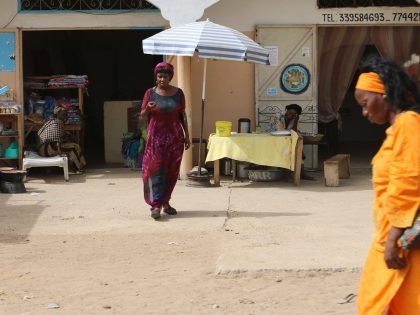Feminism, religion and culture in Senegal
- Oumar Ba
Islam is interpreted to establish the dominance of men, and this male supremacy is at the root of all our problems.

Two women walk to prayer at the mosque in Touba, built in honor of Cheickh Amadou Bàmba, founder of the Mourid brotherhood. Image credit Jay Galbraith via Flickr CC.
Following yet another TV show in Senegal which featured intolerable misogynous and sexist content, I had a conversation with two impassioned feminists, Maimouna Thior, a France-based doctoral researcher on gender and religion in Senegal, and Adama Pouye, a communications student. We decided to focus on gender norms and values and their intersection with discourse on religion and modernity, as well as Maimouna’s and Adama’s views on what it means to be young women and feminists in Senegal and its diaspora today.



